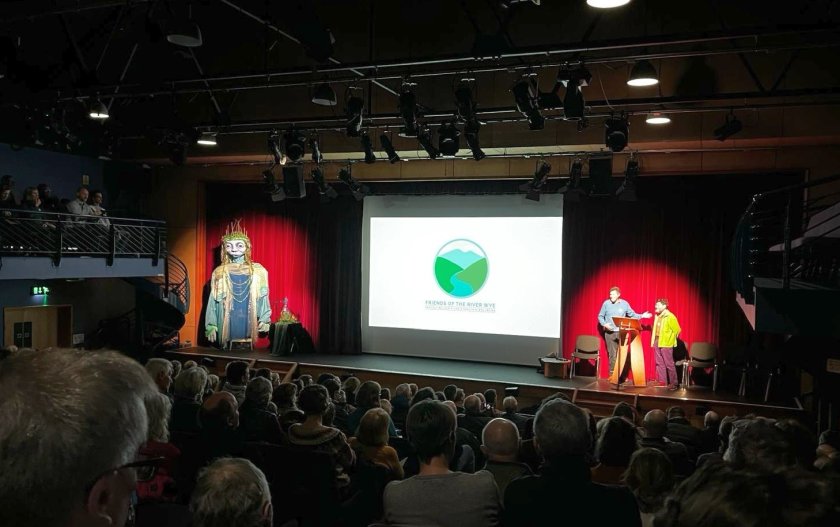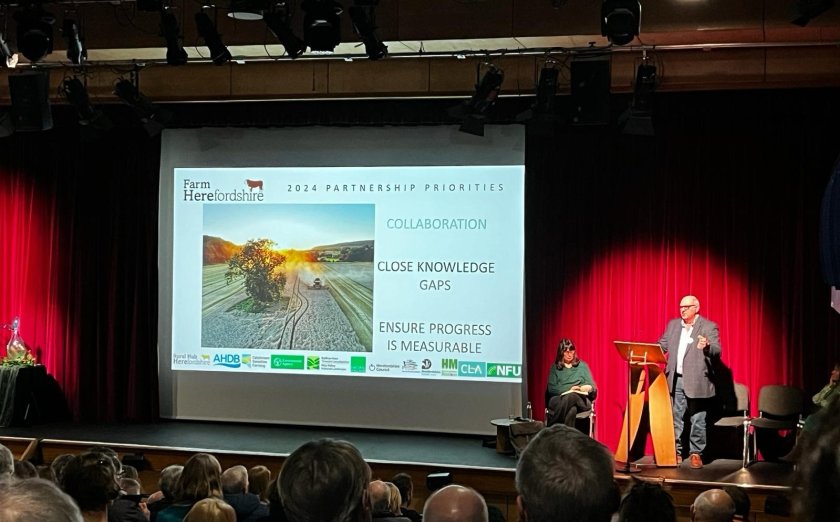
Over 300 people gathered at the Blake Theatre in Monmouth for a sold-out event to hear updates from campaign groups, councils, national agencies, charities and farm leaders on addressing the environmental damage to the River Wye.
During a meeting on Friday 23 February that lasted over 3 hours, speakers from 14 different organisations made short presentations to a vocal and, at times, frustrated audience, with freelance investigative journalist Nicola Cutcher directing questions to each in response.
Managers from Avara Foods Ltd and Noble Foods Ltd took to the stage to share 'roadmaps' to mitigate the impact of their activities in the region.
Both companies highlighted that they were not the only customers of farms in the catchment and that there was a need for other businesses, and whole industries, to take their share of responsibility.
A lack of resources was the common theme in public offices. Monmouthshire County Council, Natural England, Natural Resources Wales and the Environment Agency all bemoaned broader responsibilities and stretched budgets.
River Action UK, Wildfish, The Wildlife Trusts, and the Wye and Usk Foundation each provided statistics depicting the deterioration of the river's health and calls to arms aimed at industry and, moreover, authority.
Charles Watson, chair of River Action, stated, "Evidence of one farm inspection report obtained via a Freedom of Information Act request indicated a soil P reading ten times the permitted level, with no action taken.
"A voluntary opt-out of the law. We need more from our authorities than friendly advice on how to improve."
Nick Measham, CEO of Wildfish, indicated that levels of phosphorus in the Wye were '60% greater than the national average," adding that chicken farming "is a major part of the problem".
"Every intensive poultry unit should be permitted, with the permit cost increasing to cover the cost of inspection and enforcement."
Fownhope farmer and Farm Herefordshire joint chairman Martin Williams suggested that, as a general rule, farmers needed presenting with evidence that change was needed a couple of times before accepting the message.
However, in the case of the Wye, farmer surveys indicated that nearly 90% now recognised the importance of reducing nutrient levels in the river, and were willing to make changes.
"The barriers are funding and red tape", he said. Farm Herefordshire is a partnership composed of eleven organisations, including NFU.
At the end of Mr Williams' address, Ms Cutcher asked, "Does the NFU have a plan, and what are they advising their members?" before adding, "Is the 'No farmers, No food' campaign part of a wider 'Anti Net Zero' and environmental progress push-back?"
Soil Association campaign manager Cathy Cliff received the warmest reaction of the evening following her announcement of imminent publicity aimed at big business and the over-consumption of cheap animal protein at the expense of welfare and the environment.

"A just transition for farmers into other businesses to protect livelihoods was needed," said Cliff, but her call for "industrial poultry production to be phased out, and for plant-based diets to be more widely adopted in schools and hospitals" brought spontaneous applause.
Avara Foods' Emily Don and Andrew Brodie, supported by Patrick Lewis of Gamber Logistics Ltd, described the company's interim plan for three-quarters of the litter produced by their 16 million broiler chickens to be exported out of the catchment and into energy production or land application elsewhere in the country, at times over 250 miles away.
Since January this year, only 26% of litter from Avara's supply base has remained in the Wye catchment, and this is being applied to land on known farms that have signed up to higher independently audited standards.
Acknowledging the imperfect solution of trucking manure great distances as 'unsustainable', Lewis outlined the systems implemented to ensure comprehensive records of use were kept, including a requirement for copies of nutrient management plans with agronomist sign-off and capacity recommendations.
Whilst the area's litter supply had significantly been reduced, it had not diminished demand. Mr Lewis highlighted that other firms are now importing litter back into the Wye region for fertiliser use from elsewhere in the country.
Managing Director of Noble Foods Ltd, Liam Burke, and environmental manager Glenn Evans described a few projects undertaken on their supplying sites. Some measures taken include constructing wetlands, concreting manure handling areas, improving drainage, and increasing tree planting.
Whilst solutions were going to be different for each farm, taking account of topography or ecology, they echoed earlier calls for funding support to help farms invest in manure storage.
Burke, estimating that Noble represented just 2.5% of poultry in the region, outlined their plan to introduce an environmental incentive scheme for their producers.
Crediting Noble Foods and Avara for their presence at the event, Cutcher mockingly read an email from the British Egg Industry Council, who had initially agreed to attend before the agenda was distributed and subsequent apologies sent. "Do they have nothing to say? Is anyone else doing anything?" she asked Burke. "No," he replied.
Referring to the IPPC permitted threshold of 40,000 birds, she asked, "Would you support lower thresholds?" Mr Burke replied, "We already operate to those standards voluntarily."
In the following exchange, Mr Burke explained that while Noble Foods holds their suppliers to higher standards than others, it puts his business at a potential competitive disadvantage as farmers can leave to supply other, less scrupulous, packers.
Before the official bodies took to the stage, Wye and Usk Foundation CEO Simon Evans spoke of the importance of soil health, not just the river, and reiterated the need to enforce a regulatory framework across the English / Welsh border. "Flooding or drought isn't just about climate change. Soil health determines so much about river health."
It was late into the evening when Emma Johnson of Natural England gave her presentation. Ms Johnson used photographs to describe the soil structure and composition problems that gave rise to flooding and run-off, reporting a problem not just a decade or two in the making but a century.
According to Johnson, pre and post-war food production boom, population growth, and changing diets were as responsible as poultry in more recent times.
Nonetheless, 50% of her team were currently deployed in the Wye catchment, and they'd issued over 1000 farm advisory notices during their inspections, 500 of which pertained to soil health.
Environment Agency chair Alan Lovell addressed the NFU Conference earlier in the week, trading heavy verbal blows with the Birmingham audience.
Friday's exchange was no less direct or abrasive, with irate spectators repeatedly interrupting his delivery. Mr Lovell explained the acceleration in the activity of the EA in the past two years and the five-fold increase in inspections of water companies, which is also a vital part of the watercourse pollution problem.
Returning to focus on farming, he reported that in 2021/22, there were 99 farm inspections conducted within the Wye region, 227 the following year, and 213 this year.
Non-compliance was still widespread. 116 of 213 inspected farms had at least one non-compliance, and a total of 315 improvement actions had been issued so far, with the most common reflecting a lack of up-to-date soil testing or inadequate nutrient management planning.
In addition to the boots-on-the-ground inspections, the EA is now conducting remote inspections using technology such as drones and satellite tracking. Nearly 300 such assessments have been conducted already this year.
While the degree of scrutiny on farming has increased substantively, Mr Lovell was clear that the degree of compliance on the permitted sites was generally good. Of the 76 poultry farms within the Wye catchment, 66 had been inspected in 2023.
Scores are graded A to F, with A being the highest standard. 59 of the 60 scores confirmed recorded either A or B, with one site scoring C.
The conclusion was that the issues do not sit with the permitted sites. At this point, Mr Lovell explained that the Agency prioritised influencing DEFRA to reduce the current IPPC 40,000 bird limit 'markedly'.
Challenged by Ms Cutcher, working hard to control the audience's questions, Mr Lovell was asked why the Environment Agency was not enforcing the law.
"Every other organisation can provide advice or guidance. Your USP is enforcement," she said. "It's not an easy time to be a farmer" and "We have to give people the opportunity to comply" did not satisfy those listening.
Sir David Henshaw, chair of Natural Resources Wales, was given the final word. Losing his voice, he expressed his desire for all parties to work together.
He reiterated the need for more significant resources on the Welsh side of the border. As the meeting extended beyond 10 pm and among cries of "corporate claptrap" and "what are you doing?", patience had been exhausted.
As Ms Cutcher sought to put similar questions to Sir David regarding a timescale for law enforcement in place of advisory notices, a strained response of "prosecution is not the only answer" and "it's tough being a Welsh farmer" was nearly drowned out.
